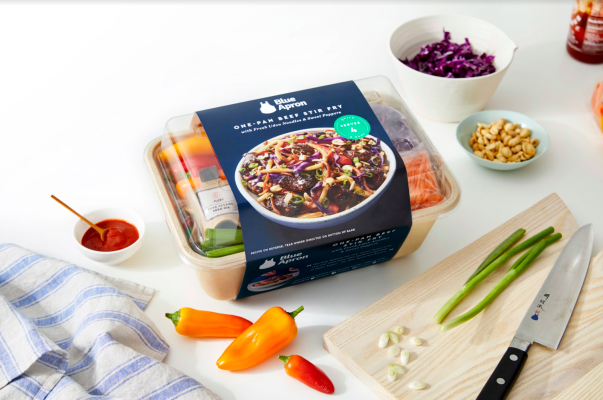
Blue Apron announced today it will bring its meal kits to stores. The news arrives at a time when the meal kit subscription company is struggling to grow and retain its users, who are often put off by the expense of the direct-shipped meal kits and the need to commit to an ongoing subscription. In recent months, Blue Apron has also laid off hundreds, lost its CEO, and has continued to post disappointing earnings.
In February, the company reported its subscriber base had fallen to 746,000, down from 856,000 the prior quarter, and down from its peak of one million last year.
Earlier this month, its stock took another hit as Weight Watchers announced its own plans to sell meal kits in stores. Walmart had also said the same, adding that its meal kits would be available via its online grocery service for curbside pickup or delivery. Other grocers, like Albertsons and Kroger, are now selling meal kits, too. Plus, Amazon has been testing out meal kits on its site for some time, too.
That means Blue Apron, which has already ceded some portion of its users to rival services like HelloFresh, the second-biggest meal kit company in the U.S., is now not only facing threats from competitors with similar offerings, but has to take on a plethora of meal kit alternatives sold in stores and from the two largest retailers, Amazon and Walmart. And many competitors’ kits would cost less and not require ongoing subscription payments.
In an emailed statement, a Blue Apron spokesperson says the new in-store meal kit offering will make its brand “more accessible to homes across the country,” and “will provide the unique and consistent product experience that our customers have come to know and expect from us, including high-quality ingredients and chef-driven recipes.”
The in-store kits could also serve as a user acquisition strategy for Blue Apron’s subscription business, as they’d offer consumers a way to sample the recipes ahead of signing up for shipments.
The company didn’t say which grocery stores would sell its kits, but did say that some of the retailers it’s talking to already sell their own kits, according to The WSJ’s interview with new CEO Brad Dickerson. Blue Apron also didn’t say what the in-store kits would cost, but noted it expects them to arrive on shelves before year-end.
Meal kits aren’t the only way Blue Apron is attempting to grow its business in the wake of increased competition. It also in January began selling a Whole30 meal plan, focused on wholesome foods that align with partner Whole30’s nutrition guidelines. And it launched Mediterranean Diet recipes to cater to those looking for other ways of healthy eating.
Blue Apron’s stock is up 8 percent on the news, as the time of writing.


